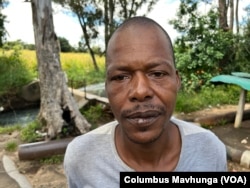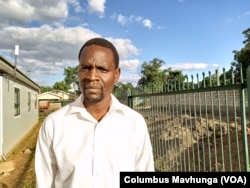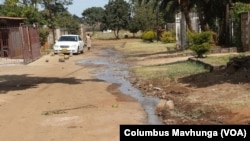Authorities in Zimbabwe are attempting to enforce laws penalizing companies that discharge waste into rivers, which are used for water by citizens downstream.
The the sound of raw sewage spilling into the Mukuvisi River in the Harare suburb of Waterfalls. Local resident Mike Pfaranda is concerned about this situation.
“Sewage is mixing with water. It has been like this for a long time. This is how we contract diseases like cholera," Pfaranda said. "I appeal to our council to repair the burst pipes. It has been a year like this. If they repair the pipes, that would have really assisted us so that we live a good life. They should assist us.”
About 400 meters downstream, a woman is washing her son in the same river where raw sewage is flowing into the river after she finished laundry.
Rueben Akili from the Combined Harare Residents Association said authorities must deal with more than the sewage issue.
“As an association, we note with concern the issue of discharge of pollutants into the main rivers," Akili said. "Harare is located on the catchment area of Lake Chivero, Seke Dam and Harava (Dam). Some of the industries, they discharge pollutants into the river, which have a bearing on water purification for the local authority, and even have a bearing on aquatic life and biodiversity.”
In a written statement, the government’s Environmental Management Agency, which is responsible for the prevention of pollution, said, “Dilapidated and overwhelmed national sewer infrastructure, prolonged legal proceedings, non-deterrent fines and absence of properly engineered waste dumping facilities for both general and hazardous waste” were some of the reasons for water pollution in Zimbabwe.
It added that its last survey revealed that about 400 megaliters of partially treated or raw sewage was being discharged into the environment daily nationwide.







